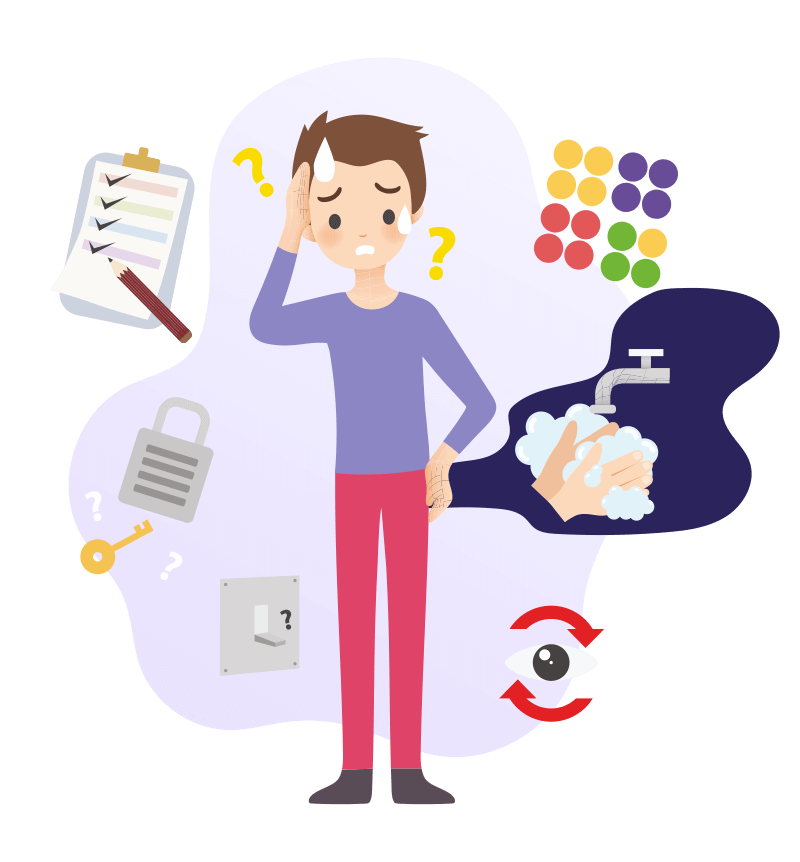ACT or Acceptance and Commitment Therapy is one of the most effective therapies for OCD that has been around for a while. It is a form of Cognitive Behavior Therapy (CBT) that helps individuals to change the way they think and behave. The therapy was first developed in 1986 by Steven Hayes, Kelly Wilson, and Kirk Strosahl. ACT helps treat different mental health conditions such as anxiety disorders, depression, bipolar disorder, addiction, etc.
Contents
Understanding ACT For OCD

ACT is a type of CBT that focuses on helping people to accept the things that are out of their control and focus on the things that they can control. The therapy uses mindfulness and acceptance techniques to help people deal with their thoughts, emotions, and behaviors. The goal of ACT is to help people live a more meaningful and fulfilling life.
Theory Behind ACT
The theory behind ACT is that our thoughts, emotions, and behaviors are all interconnected. Therefore, by changing our thoughts and emotions, we can change our behavior. ACT aims to help us become more aware of our thoughts and feelings so that we can control them better. It also teaches us how to accept our thoughts and feelings without judging them. This acceptance will help us to live in the present moment and not get caught up in our past or future.
Techniques That It Involves
ACT involves several different techniques, including mindfulness, acceptance, and commitment.
- Mindfulness is the practice of being present in the moment and observing your thoughts and emotions without judgment.
- Acceptance is the act of accepting your thoughts and emotions without trying to change them.
- Commitment is the act of setting goals and making plans to achieve them.
How Can It Help Treat OCD
ACT helps treat OCD because it helps individuals to change their relationships with their thoughts and emotions. It helps them to become more aware of their thoughts and emotions and to accept them without judgment. This acceptance will help them to control their OCD symptoms better.
Is It Accompanied By Medication
ACT can be used as a standalone treatment for OCD or it can be used in conjunction with medication. If you are considering using ACT for OCD, it is important to speak to your doctor or mental health professional to see if it is right for you.
ACT Treatment Outpatient Vs. Inpatient
ACT can be done on an outpatient basis, which means that you will not have to stay in a hospital or treatment center. This allows you to continue with your day-to-day life while receiving treatment.
However, ACT can also be done on an inpatient basis, which means that you will stay in a hospital or treatment center while receiving treatment. This allows you to focus solely on your treatment and recovery.
Evaluating ACT For OCD
There are several ways to evaluate whether or not ACT is right for you.
- One way is to speak to your doctor or mental health professional. They will be able to assess your symptoms and give you their professional opinion.
- Another way is to read about ACT and see if it aligns with your personal beliefs.
- Finally, you can try attending a few sessions of ACT and see how you feel afterward.
Benefits of ACT For OCD Recovery
There are several benefits of ACT for OCD recovery, including:
- improved symptoms,
- increased quality of life, and
- increased self-esteem.
ACT has also been found to help treat other mental health conditions. Such as depression, anxiety, bipolar disorder, and addiction.
Biological Effects of ACT-OCD
There are several biological effects of ACT-OCD, including increased levels of serotonin and dopamine.
- Serotonin is a neurotransmitter that is responsible for regulating mood and anxiety.
- Dopamine is a neurotransmitter that is responsible for regulating pleasure and motivation.
Limitations of ACT For OCD Recovery
There are several limitations of ACT for OCD recovery, including:
- The fact is that it is a long-term treatment and it can be difficult to find a qualified therapist.
- Additionally, ACT can be expensive, and insurance may not cover it.
Why Consider It
ACT is a promising treatment for OCD, and it helps treat other mental health conditions. However, it is important to speak to your doctor or mental health professional to see if it is right for you. If you are considering using the ACT for OCD, it is important to weigh the pros and cons before making a decision.
Finding ACT Therapist For OCD
If you are considering using ACT for OCD, it is important to find a qualified therapist.
How To Get Started
There are several ways to find a qualified therapist, including:
- speaking to your doctor or mental health professional,
- searching online, or
- looking in the yellow pages.
What To Look Out For
- When choosing a therapist, it is important to make sure that they are certified in the ACT and have experience treating OCD.
- Additionally, you should make sure that the therapist you choose is someone you feel comfortable with and who you can trust.
- Finally, it is important to make sure that the therapist you choose has a good understanding of your symptoms and your goals for treatment.
Also, it is important to make sure that you feel comfortable with the therapist and that they are respectful of your boundaries.
Red Flags To Avoid
When choosing a therapist, there are several red flags to avoid, including, therapists who:
- claim to be able to cure OCD,
- refuse to treat you unless you take medication, and
- tell you that your symptoms are all in your head.
If you see any of these red flags, it is important to find a different therapist.
NOTE: If you are interested in using ACT for OCD, Mantra Care can help you find a qualified therapist. We offer a listing of alternative therapies for OCD, which includes information on the therapists’ experience, qualifications, and insurance coverage.
Listing Alternative Therapies For OCD
Apart from ACT, other alternative therapies can be used to treat OCD. Some of these include:
- Cognitive-behavioral therapy (CBT): CBT is a type of therapy that focuses on changing the thoughts and behaviors that contribute to OCD. CBT can be done in individual, group, or family sessions.
- Exposure and response prevention (ERP): ERP is a type of therapy that involves gradually exposing yourself to the things that trigger your OCD symptoms and learning how to resist the urge to engage in compulsions.
- Medication: Medication can help treat OCD by reducing the symptoms. Medications that commonly treat OCD include antidepressants, anti-anxiety medications, and antipsychotics.
Which Is The Effective Therapy
There is no one-size-fits-all answer to this question. The most effective therapy for OCD will vary depending on the individual’s symptoms, goals, and comfort level.
Additionally, it is important to make sure that the therapist you choose is certified in the ACT and has experience treating OCD. If you have any concerns, it is important to speak to your doctor or mental health professional.
They will be able to assess your symptoms and give you their professional opinion. Additionally, they will be able to refer you to a qualified therapist. Finally, they will be able to help you decide whether or not ACT is right for you.
Conclusion
ACT for OCD is a promising new treatment for Obsessive-Compulsive Disorder that shows great promise. However, as with any new treatment, there are some limitations and risks associated with it. It is important to consult with a qualified mental health professional to see if ACT for OCD is right for you. With the proper guidance and support, ACT for OCD can be an effective tool in your journey to recovery.
If you are looking for affordable Online OCD Counseling MantraCare can help: Book a trial OCD therapy session


